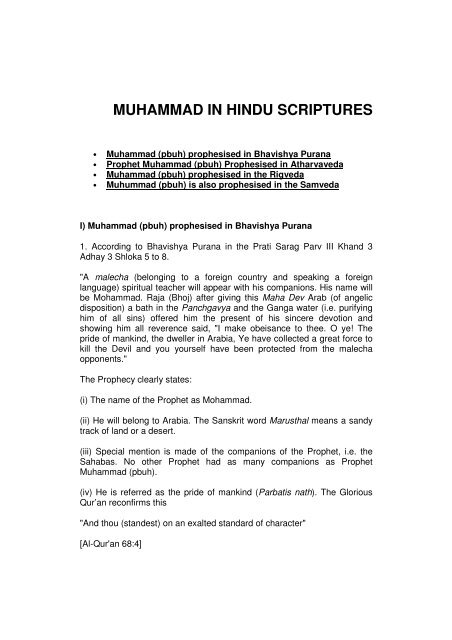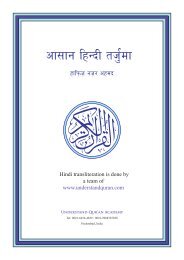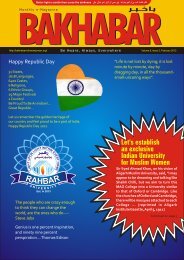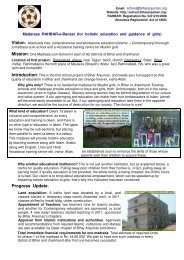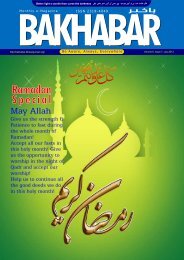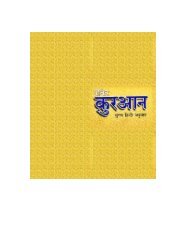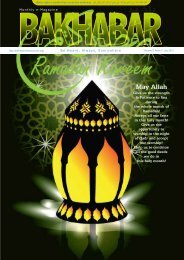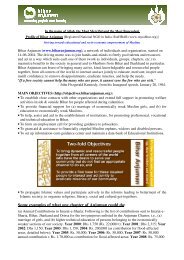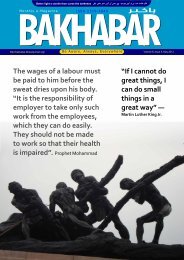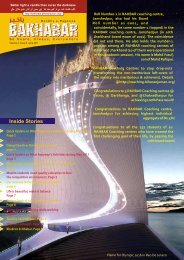Prophet Muhammed in Hindu Scriptures, By Dr ... - Bihar Anjuman
Prophet Muhammed in Hindu Scriptures, By Dr ... - Bihar Anjuman
Prophet Muhammed in Hindu Scriptures, By Dr ... - Bihar Anjuman
You also want an ePaper? Increase the reach of your titles
YUMPU automatically turns print PDFs into web optimized ePapers that Google loves.
MUHAMMAD IN HINDU SCRIPTURES• Muhammad (pbuh) prophesised <strong>in</strong> Bhavishya Purana• <strong>Prophet</strong> Muhammad (pbuh) Prophesised <strong>in</strong> Atharvaveda• Muhammad (pbuh) prophesised <strong>in</strong> the Rigveda• Muhummad (pbuh) is also prophesised <strong>in</strong> the SamvedaI) Muhammad (pbuh) prophesised <strong>in</strong> Bhavishya Purana1. Accord<strong>in</strong>g to Bhavishya Purana <strong>in</strong> the Prati Sarag Parv III Khand 3Adhay 3 Shloka 5 to 8."A malecha (belong<strong>in</strong>g to a foreign country and speak<strong>in</strong>g a foreignlanguage) spiritual teacher will appear with his companions. His name willbe Mohammad. Raja (Bhoj) after giv<strong>in</strong>g this Maha Dev Arab (of angelicdisposition) a bath <strong>in</strong> the Panchgavya and the Ganga water (i.e. purify<strong>in</strong>ghim of all s<strong>in</strong>s) offered him the present of his s<strong>in</strong>cere devotion andshow<strong>in</strong>g him all reverence said, "I make obeisance to thee. O ye! Thepride of mank<strong>in</strong>d, the dweller <strong>in</strong> Arabia, Ye have collected a great force tokill the Devil and you yourself have been protected from the malechaopponents."The Prophecy clearly states:(i) The name of the <strong>Prophet</strong> as Mohammad.(ii) He will belong to Arabia. The Sanskrit word Marusthal means a sandytrack of land or a desert.(iii) Special mention is made of the companions of the <strong>Prophet</strong>, i.e. theSahabas. No other <strong>Prophet</strong> had as many companions as <strong>Prophet</strong>Muhammad (pbuh).(iv) He is referred as the pride of mank<strong>in</strong>d (Parbatis nath). The GloriousQur’an reconfirms this"And thou (standest) on an exalted standard of character"[Al-Qur'an 68:4]
"Ye have <strong>in</strong>deed <strong>in</strong> the Messenger of Allah, a beautiful pattern (ofconduct)".[Al-Qur'an 33:21](v) He will kill the devil, i.e. abolish idol worship and all sorts of vices.(vi) The <strong>Prophet</strong> will be given protection aga<strong>in</strong>st his enemy.Some people may argue that Raja Bhoj mentioned <strong>in</strong> the prophecy lived <strong>in</strong>the 11th century C.E. 500 years after the advent of <strong>Prophet</strong> Muhammad(pbuh) and was the descendant <strong>in</strong> the 10th generation of Raja Shalivahan.These people fail to realise that there was not only one Raja of the nameBhoj. The Egyptian Monarchs were called as Pharaoh and the RomanK<strong>in</strong>gs were known as Caesar, similarly the Indian Rajas were given thetitle of Bhoj. There were several Raj Bhoj who came before the one <strong>in</strong> 11thCentury C.E.The <strong>Prophet</strong> did not physically take a bath <strong>in</strong> the Panchgavya and thewater of Ganges. S<strong>in</strong>ce the water of Ganges is considered holy, tak<strong>in</strong>gbath <strong>in</strong> the Ganges is an idiom, which means wash<strong>in</strong>g away s<strong>in</strong>s orimmunity from all sorts of s<strong>in</strong>s. Here the prophecy implies that <strong>Prophet</strong>Muhammad (pbuh) was s<strong>in</strong>less, i.e. Maasoom.2. Accord<strong>in</strong>g to Bhavishya Purana <strong>in</strong> the Pratisarag Parv III Khand 3Adhay 3 Shloka 10 to 27 Maharishi Vyas has prophesised:"The Malecha have spoiled the well-known land of the Arabs. AryaDharma is not to be found <strong>in</strong> the country. Before also there appeared amisguided fiend whom I had killed; he has now aga<strong>in</strong> appeared be<strong>in</strong>g sentby a powerful enemy. To show these enemies the right path and to givethem guidance, the well-known Muhammad (pbuh), is busy <strong>in</strong> br<strong>in</strong>g<strong>in</strong>g thePishachas to the right path. O Raja, You need not go to the land of thefoolish Pishachas, you will be purified through my k<strong>in</strong>dness even whereyou are. At night, he of the angelic disposition, the shrewd man, <strong>in</strong> theguise of Pishacha said to Raja Bhoj, "O Raja! Your Arya Dharma has beenmade to prevail over all religions, but accord<strong>in</strong>g to the commandments ofIshwar Parmatma, I shall enforce the strong creed of the meat eaters. Myfollowers will be men circumcised, without a tail (on his head), keep<strong>in</strong>gbeard, creat<strong>in</strong>g a revolution announc<strong>in</strong>g the Aadhaan (the Muslim call forprayer) and will be eat<strong>in</strong>g all lawful th<strong>in</strong>gs. He will eat all sorts of animalsexcept sw<strong>in</strong>e. They will not seek purification from the holy shrubs, but willbe purified through warfare. On account of their fight<strong>in</strong>g the irreligiousnations, they will be known as Musalmaans. I shall be the orig<strong>in</strong>ator of thisreligion of the meat-eat<strong>in</strong>g nations."
The Prophecy states that:(i) The evil doers have corrupted the Arab land.(ii) Arya Dharma is not found <strong>in</strong> that land.(iii) The Indian Raja need not go the Arab land s<strong>in</strong>ce his purification willtake place <strong>in</strong> India after the musalmaan will arrive <strong>in</strong> India.(iv) The com<strong>in</strong>g <strong>Prophet</strong> will attest the truth of the Aryan faith, i.e.Monotheism and will reform the misguided people.(v) The <strong>Prophet</strong>’s followers will be circumcised. They will be without a tailon the head and bear a beard and will create a great revolution.(vi) They will announce the Aadhaan, i.e. ‘the Muslim call for prayer’.(vii) He will only eat lawful th<strong>in</strong>gs and animals but will not eat pork. TheQur’an confirms this <strong>in</strong> no less than 4 different places:In Surah Al-Baqarah chapter 2 verse 173In Surah Al-Maidah chapter 5 verse 3In Surah Al-Anam chapter 6 verse 145In Surah Al-Nahl chapter 16 verse 115"Forbidden to you for food are dead meat, blood, flesh of sw<strong>in</strong>e, and thaton which hath been <strong>in</strong>voked the name of other than Allah".(viii) They will not purify with grass like the H<strong>in</strong>dus but by means of swordthey will fight their irreligious people.(ix) They will be called musalmaan.(x) They will be a meat-eat<strong>in</strong>g nation.The eat<strong>in</strong>g of herbivorous animals is confirmed by the Qur’an <strong>in</strong> SurahMaidah, chapter 5 verse 1 and <strong>in</strong> Surah Mum<strong>in</strong>un chapter 23 verse 213. Accord<strong>in</strong>g to Bhavishya Purana, Parv - III Khand 1 Adhay 3 Shloka 21-23:"Corruption and persecution are found <strong>in</strong> seven sacred cities of Kashi, etc.India is <strong>in</strong>habited by Rakshas, Shabor, Bhil and other foolish people. In
the land of Malechhas, the followers of the Malechha dharma (Islam) arewise and brave people. All good qualities are found <strong>in</strong> Musalmaans and allsorts of vices have accumulated <strong>in</strong> the land of the Aryas. Islam will rule <strong>in</strong>India and its islands. Hav<strong>in</strong>g known these facts, O Muni, glorify the nameof thy lord".The Qur’an confirms this <strong>in</strong> Surah Taubah chapter 9 verse 33 and <strong>in</strong>Surah Al Saff chapter 61 verse 9:"It is He who hath sent His Messenger with Guidance and the Religion ofTruth, to proclaim it over all religion, even though the Pagans may detest(it)".A similar message is given <strong>in</strong> Surah Fatah chapter 48 verses 28 end<strong>in</strong>gwith, "and enough is Allah as a witness".topII <strong>Prophet</strong> Muhammad (pbuh) Prophesised <strong>in</strong> Atharvaveda1. In the 20th book of Atharvaveda Hymn 127 Some Suktas (chapters) areknown as Kuntap Sukta. Kuntap means the consumer of misery andtroubles. Thus mean<strong>in</strong>g the message of peace and safety and if translated<strong>in</strong> Arabic means Islam.Kuntap also means hidden glands <strong>in</strong> the abdomen. These mantras arecalled so probably because their true mean<strong>in</strong>g was hidden and was to berevealed <strong>in</strong> future. Its hidden mean<strong>in</strong>g is also connected with the navel orthe middle po<strong>in</strong>t of this earth. Makkah is called the Ummul Qur’a themother of the towns or the naval of the earth. In many revealed books itwas the first house of Div<strong>in</strong>e worship where God Almighty gave spiritualnourishment to the world. The Qur’an says <strong>in</strong>Surah Ali-Imran chapter 3, verse 96:"The first house (of worship) appo<strong>in</strong>ted for men was that at Bakkah(Makkah) full of bless<strong>in</strong>gs and of guidance and for all k<strong>in</strong>ds of be<strong>in</strong>gs".Thus Kuntap stands for Makkah or Bakkah.Several people have translated these Kuntap Suktas like M. Bloomfield,Prof. Ralph Griffith, Pandit Rajaram, Pandit Khem Karan, etc.
The ma<strong>in</strong> po<strong>in</strong>ts mentioned <strong>in</strong> the Kuntap Suktas i.e. <strong>in</strong> Atharvaveda book20 Hymn 127 verses 1-13 are:Mantra 1He is Narashansah or the praised one (Muhammad). He is Kaurama: thepr<strong>in</strong>ce of peace or the emigrant, who is safe, even amongst a host of60,090 enemies.b) Mantra 2He is a camel-rid<strong>in</strong>g Rishi, whose chariot touches the heaven.c) Mantra 3He is Mamah Rishi who is given a hundred gold co<strong>in</strong>s, ten chaplets(necklaces), three hundred good steeds and ten thousand cows.d) Mantra 4Vachyesv rebh. ‘Oh! ye who glorifies’.(i) The Sanskrit word Narashansah means ‘the praised one’, which is theliteral translation of the Arabic word Muhammad (pbuh).The Sanskrit word Kaurama means ‘one who spreads and promotespeace’. The holy <strong>Prophet</strong> was the ‘Pr<strong>in</strong>ce of Peace’ and he preachedequality of human k<strong>in</strong>d and universal brotherhood. Kaurama also meansan emigrant. The <strong>Prophet</strong> migrated from Makkah to Mad<strong>in</strong>ah and was thusalso an Emigrant.(ii) He will be protected from 60,090 enemies, which was the population ofMakkah. The <strong>Prophet</strong> would ride a camel. This clearly <strong>in</strong>dicates that itcannot be an Indian Rishi, s<strong>in</strong>ce it is forbidden for a Brahman to ride acamel accord<strong>in</strong>g to the Sacred Books of the East, volume 25, Laws ofManu pg. 472. Accord<strong>in</strong>g to Manu Smirti chapter 11 verse 202, "ABrahman is prohibited from rid<strong>in</strong>g a camel or an ass and to bathe naked.He should purify himself by suppress<strong>in</strong>g his breath".(iii) (a) This mantra gave the Rishi's name as Mamah. No rishi <strong>in</strong> India oranother <strong>Prophet</strong> had this name Mamah which is derived from Mah whichmeans to esteem highly, or to revere, to exalt, etc. Some Sanskrit booksgive the <strong>Prophet</strong>’s name as ‘Mohammad’, but this word accord<strong>in</strong>g toSanskrit grammar can also be used <strong>in</strong> the bad sense. It is <strong>in</strong>correct toapply grammar to an Arabic word. Actually shas the same mean<strong>in</strong>g andsomewhat similar pronunciation as the word Muhammad (pbuh).
(b) He is given 100 gold co<strong>in</strong>s, which refers to the believers and the earliercompanions of the <strong>Prophet</strong> dur<strong>in</strong>g his turbulent Makkan life. Later on dueto persecution they migrated from Makkah to Abys<strong>in</strong>ia. Later when<strong>Prophet</strong> migrated to Mad<strong>in</strong>ah all of them jo<strong>in</strong>ed him <strong>in</strong> Mad<strong>in</strong>ah.(c) The 10 chaplets or necklaces were the 10 best companions of the Holy<strong>Prophet</strong> (pbuh) known as Ashra-Mubbashshira (10 bestowed with goodnews). These were foretold <strong>in</strong> this world of their salvation <strong>in</strong> the hereafteri.e. they were given the good news of enter<strong>in</strong>g paradise by the <strong>Prophet</strong>’sown lips and after nam<strong>in</strong>g each one he said "<strong>in</strong> Paradise". They were AbuBakr, Umar, Uthman, Ali, Talha, Zubair, Abdur Rahman Ibn Auf, Saad b<strong>in</strong>Abi Waqqas, Saad b<strong>in</strong> Zaid and Abu Ubaidah (May Allah be well-pleasedwith all of them).(d) The Sanskrit word Go is derived from Gaw which means ‘to go to war’.A cow is also called Go and is a symbol of war as well as peace. The10,000 cows refer to the 10,000 companions who accompanied the<strong>Prophet</strong> (pbuh) when he entered Makkah dur<strong>in</strong>g Fateh Makkah which wasa unique victory <strong>in</strong> the history of mank<strong>in</strong>d <strong>in</strong> which there was no bloodshed. The 10,000 companions were pious and compassionate like cowsand were at the same time strong and fierce and are described <strong>in</strong> the HolyQuran <strong>in</strong> Surah Fatah:"Muhammad is the Messenger of Allah; and those who are with him arestrong aga<strong>in</strong>st unbelievers, (but) compassionate amongst each other."[Al-Qur'an 48:29](iv) This mantra calls the <strong>Prophet</strong> as Rebh which means one who praises,which when translated <strong>in</strong>to Arabic is Ahmed, which is another name forthe Holy <strong>Prophet</strong> (pbuh).2. Battle of the Allies described <strong>in</strong> the Vedas.It is mentioned <strong>in</strong> Atharvaveda Book XX Hymn 21 verse 6, "Lord of thetruthful! These liberators dr<strong>in</strong>k these feats of bravery and the <strong>in</strong>spir<strong>in</strong>gsongs gladdened thee <strong>in</strong> the field of battle. When thou renders vanquishedwithout fight the ten thousand opponents of the pray<strong>in</strong>g one, the ador<strong>in</strong>gone."(i) This Prophecy of the Veda describes the well-known battle of Ahzab orthe battle of the Allies dur<strong>in</strong>g the time of <strong>Prophet</strong> <strong>Muhammed</strong>. The <strong>Prophet</strong>was victorious without an actual conflict which is mentioned <strong>in</strong> the Qur’an<strong>in</strong> Surah Ahzab:
"When the believers saw the confederate forces they said, "This is whatAllah and His Messenger had promised us and Allah and His Messengertold us what was true." And it only added to their faith and their zeal <strong>in</strong>obedience."[Al-Qur'an 33:22](ii) The Sanskrit word karo <strong>in</strong> the Mantra means the ‘pray<strong>in</strong>g one’ whichwhen translated<strong>in</strong>to Arabic means ‘Ahmed’, the second name of <strong>Prophet</strong> <strong>Muhammed</strong>(pbuh).iii) The 10,000 opponents mentioned <strong>in</strong> the Mantra were the enemies ofthe <strong>Prophet</strong> and the Muslims were only 3000 <strong>in</strong> number.iv) The last words of the Mantra aprati ni bashayah means the defeat wasgiven to the enemies without an actual fight.3. The enemies’ defeat <strong>in</strong> the conquest of Makkah is mentioned <strong>in</strong>Atharvaveda book 20 Hymn 21 verse no 9:"You have O Indra, overthrown 20 k<strong>in</strong>gs and 60,099 men with anoutstripp<strong>in</strong>g Chariot wheel who came to fight the praised one or far famed(Muhammad) orphan."i) The population of Makkah at the time of <strong>Prophet</strong>’s advent was nearly60,000.ii) There were several clans <strong>in</strong> Makkah each hav<strong>in</strong>g its own chief. Totallythere were about 20 chiefs to rule the population of Makkah.iii) An Abandhu mean<strong>in</strong>g a helpless man who was far-famed and ‘praisedone’. Muhammad (pbuh) overcame his enemies with the help of God.topIII Muhammad (pbuh) prophesised <strong>in</strong> the RigvedaA similar prophecy is also found <strong>in</strong> Rigveda Book I, Hymn 53 verse 9:The Sanskrit word used is Sushrama, which means praiseworthy or wellpraised which <strong>in</strong> Arabic means Muhammad (pbuh).
topIV Muhummad (pbuh) is also prophesised <strong>in</strong> the Samveda<strong>Prophet</strong> Muhammad (pbuh) is also prophesised <strong>in</strong> the Samveda Book IIHymn 6 verse 8:"Ahmed acquired from his Lord the knowledge of eternal law. I receivedlight from him just as from the sun." The Prophecy confirms:i) The name of the <strong>Prophet</strong> as Ahmed s<strong>in</strong>ce Ahmed is an Arabic name.Many translators misunderstood it to be Ahm at hi and translated themantra as "I alone have acquired the real wisdom of my father".ii) <strong>Prophet</strong> was given eternal law, i.e. the Shariah.iii) The Rishi was enlightened by the Shariah of <strong>Prophet</strong> Muhammad. TheQur’an says <strong>in</strong> Surah Saba chapter 34 verse 28"We have not sent thee but as a universal (Messenger) to men, giv<strong>in</strong>gthem glad tid<strong>in</strong>gs and warn<strong>in</strong>g them (aga<strong>in</strong>st s<strong>in</strong>), but most menunderstand not."[Al-Qur'an 34:28]top


